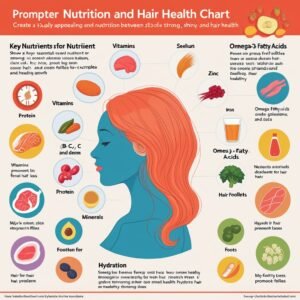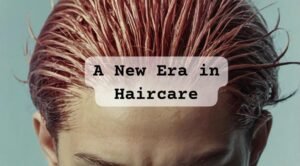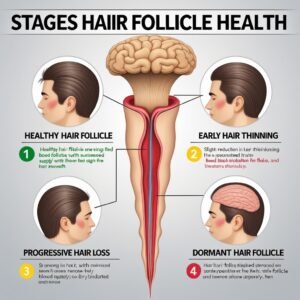Pregnancy is a life-changing experience, but it can also bring about significant changes in your body, including your hair. Many women experience hair problems after pregnancy, ranging from hair loss to changes in texture and thickness. You can regain healthy hair by knowing the causes of these issues and how to address them.

Causes of Hair Problems After Pregnancy
1. **Hormonal Changes**
During pregnancy, elevated hormone levels cause a shift in the hair growth cycle. The body holds onto hair for longer periods, which results in thicker, fuller hair. However, after childbirth, these hormone levels drop, leading to the shedding phase of the hair growth cycle. This process is frequently referred to as “postpartum hair loss.”
2. **Stress and Nervousness**
The challenges of caring for a newborn, along with the physical recovery after childbirth, can contribute to increased stress. Stress is a major factor that can exacerbate hair loss and lead to conditions like **telogen effluvium**, where hair falls out more rapidly than normal.
3. **Nutritional Deficiencies**
During pregnancy, nutritional needs increase to support both the mother and baby. After childbirth, if a mother doesn’t maintain a balanced diet or doesn’t get enough essential nutrients like iron, biotin, or vitamins A and D, this can lead to hair thinning or loss.
4. **Postpartum Hormonal Imbalance**
After childbirth, your body goes through hormonal fluctuations as it returns to its pre-pregnancy state. This imbalance can negatively affect hair follicles, contributing to thinning or shedding.
5. **Thyroid Imbalance**
Pregnancy can impact thyroid function, and some women may experience thyroid imbalances after pregnancy. This can lead to hair thinning or loss, often linked to both an underactive (hypothyroidism) or overactive (hyperthyroidism) thyroid.
Solutions for Hair Problems After Pregnancy

1. **Patience**
Postpartum hair loss is usually temporary. After childbirth, the majority of women experience hair loss for about three to six months, but the hair typically regrows on its own. Therefore, the first solution is to be patient and give your body time to adjust to its hormonal changes.
2. **Maintain a Healthy Diet**
For healthy hair, a well-balanced diet is essential. Ensure you’re getting sufficient nutrients like **iron**, **zinc**, **biotin**, **vitamin D**, and **omega-3 fatty acids**. If your doctor recommends it, take biotin supplements or a “postpartum multivitamin.”
3. **Reduce Stress**
Finding ways to manage stress, such as practicing yoga, meditation, or simply ensuring that you get enough rest, can help combat hair loss. Engaging in relaxation techniques helps to regulate hormones and can reduce the negative impact of stress on your hair.
4. **Gentle Hair Care Routine**
Avoid aggressive brushing or harsh treatments. Instead, use a wide-toothed comb to minimize hair breakage and damage. During this phase, avoid heat styling tools and limit chemical treatments like coloring or perming.
5. **Use Gentle Hair Products**
Choose gentle, sulfate-free shampoos and conditioners made for thin hair. These products can help nourish the scalp and strengthen hair without causing additional damage. Look for products that contain **keratin** or **caffeine**, which help promote hair growth.
6. **Consult a Doctor**
If you experience excessive hair loss or your hair doesn’t regrow after several months, consider consulting a dermatologist or your healthcare provider. You may need a blood test to check for underlying health issues like thyroid imbalances or anemia, which could be contributing to your hair problems.
7. **Scalp Treatments**
Consider using topical treatments like **minoxidil**, which is FDA-approved for promoting hair growth. Always consult a healthcare professional before starting any new treatments, especially if you’re breastfeeding.
Conclusion
Hair problems after pregnancy are common and largely due to hormonal changes, stress, and nutritional shifts. However, with a little patience and the right care, most women see their hair return to its natural fullness after a few months. By maintaining a balanced diet, managing stress, and using gentle hair care practices, you can support your hair through this temporary phase. If hair problems persist, always consult a healthcare professional for guidance.





